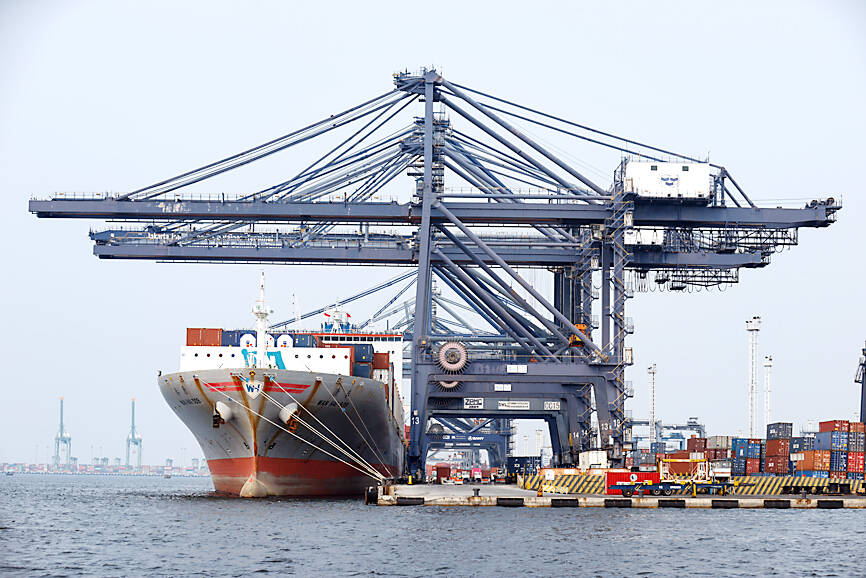Indonesia yesterday said that it had reached a trade deal with the US after an “extraordinary struggle” in negotiations that resulted in a reduction of proposed US tariff rates on the Southeast Asian country’s exports to 19 percent from 32 percent.
US President Donald Trump on Tuesday said that a deal had been struck after he spoke to Indonesian President Prabowo Subianto. The deal is among only a handful reached so far by the Trump administration ahead of an Aug. 1 deadline for negotiations.
“This is an extraordinary struggle by our negotiating team led by the Coordinating Minister for Economic Affairs,” Prabowo spokesman Hasan Nasbi told reporters yesterday.

Photo: EPA
Nasbi said that Prabowo had also negotiated directly with Trump over the phone, without giving further details.
Indonesia and the US have agreed to take trade relations into a new era, Prabowo wrote on Instagram after what he described as “a very good call” with Trump.
Indonesia — the world’s fourth-largest country by population and a member of G20 — last year had a goods trade surplus of US$17.9 billion with the US, US Trade Representative data showed.
Nasbi called the deal a “meeting point” between the two governments and said Indonesia’s tariff rate was much lower than other countries in Southeast Asia.
Indonesia, Southeast Asia’s largest economy, has committed to purchasing 50 Boeing jets, US$15 billion in US energy and US$4.5 billion of US agricultural products as part of the agreement, Trump said.
Trump outlined an Indonesia deal similar to a preliminary pact struck recently with Vietnam, with no levies on US exports to Indonesia. It also included a penalty rate for so-called transshipments of goods from China via Indonesia.
Indonesia’s stock index rose as much as 0.7 percent yesterday after the deal, which some analysts said would provide a positive catalyst for economic activities.
“Well, 19 percent is better than 32 percent,” said Matt Simpson, a senior market analyst at City Index in Brisbane, Australia.
“Indonesian non-oil exports such as footwear and textiles will take a hit, but energy and agriculture are set to gain,” Simpson said. “Officials are of course pleased because they’re in Trump’s good books.”
Natixis warned that the Indonesian economy would still be affected by Trump’s tariffs on China, Indonesia’s biggest trade partner.
Myrdal Gunarto, an economist with Maybank Indonesia, described the deal as relatively good, as Jakarta is getting a tariff below those imposed on other Southeast Asian neighbors.
The deal “opens more space for domestic lower monetary policy rate,” Gunarto said, adding that he expected it to trigger capital inflows.

POWERING UP: PSUs for AI servers made up about 50% of Delta’s total server PSU revenue during the first three quarters of last year, the company said Power supply and electronic components maker Delta Electronics Inc (台達電) reported record-high revenue of NT$161.61 billion (US$5.11 billion) for last quarter and said it remains positive about this quarter. Last quarter’s figure was up 7.6 percent from the previous quarter and 41.51 percent higher than a year earlier, and largely in line with Yuanta Securities Investment Consulting Co’s (元大投顧) forecast of NT$160 billion. Delta’s annual revenue last year rose 31.76 percent year-on-year to NT$554.89 billion, also a record high for the company. Its strong performance reflected continued demand for high-performance power solutions and advanced liquid-cooling products used in artificial intelligence (AI) data centers,

SIZE MATTERS: TSMC started phasing out 8-inch wafer production last year, while Samsung is more aggressively retiring 8-inch capacity, TrendForce said Chipmakers are expected to raise prices of 8-inch wafers by up to 20 percent this year on concern over supply constraints as major contract chipmakers Taiwan Semiconductor Manufacturing Co (TSMC, 台積電) and Samsung Electronics Co gradually retire less advanced wafer capacity, TrendForce Corp (集邦科技) said yesterday. It is the first significant across-the-board price hike since a global semiconductor correction in 2023, the Taipei-based market researcher said in a report. Global 8-inch wafer capacity slid 0.3 percent year-on-year last year, although 8-inch wafer prices still hovered at relatively stable levels throughout the year, TrendForce said. The downward trend is expected to continue this year,

Vincent Wei led fellow Singaporean farmers around an empty Malaysian plot, laying out plans for a greenhouse and rows of leafy vegetables. What he pitched was not just space for crops, but a lifeline for growers struggling to make ends meet in a city-state with high prices and little vacant land. The future agriculture hub is part of a joint special economic zone launched last year by the two neighbors, expected to cost US$123 million and produce 10,000 tonnes of fresh produce annually. It is attracting Singaporean farmers with promises of cheaper land, labor and energy just over the border.

US actor Matthew McConaughey has filed recordings of his image and voice with US patent authorities to protect them from unauthorized usage by artificial intelligence (AI) platforms, a representative said earlier this week. Several video clips and audio recordings were registered by the commercial arm of the Just Keep Livin’ Foundation, a non-profit created by the Oscar-winning actor and his wife, Camila, according to the US Patent and Trademark Office database. Many artists are increasingly concerned about the uncontrolled use of their image via generative AI since the rollout of ChatGPT and other AI-powered tools. Several US states have adopted